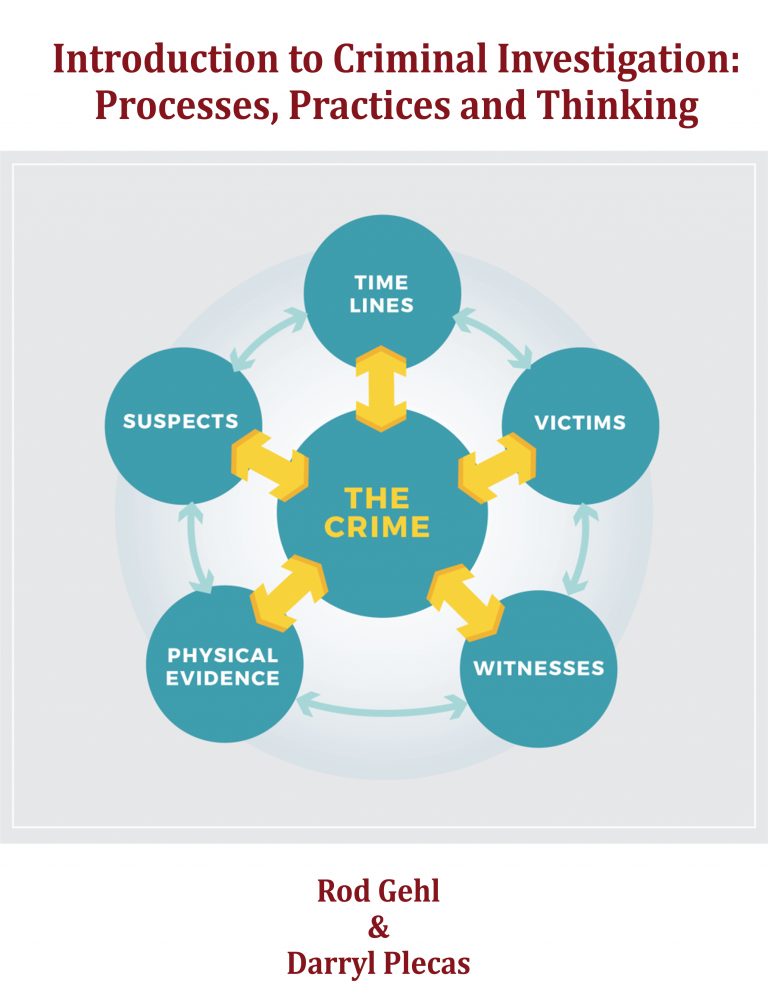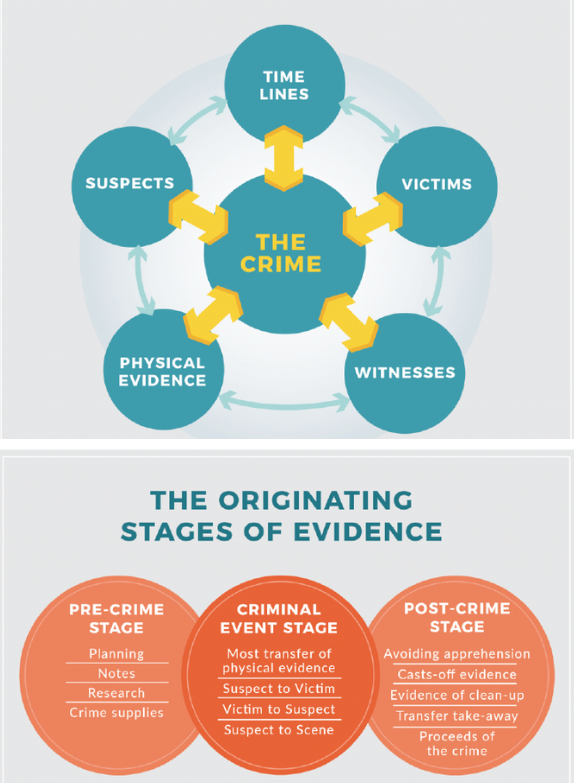
Bob Mackin
The textbook called “Introduction to Criminal Investigation: Processes, Practices and Thinking” probably won’t knock columnist Jack Knox’s “On the Rocks” out of top spot on the British Columbia bestsellers list. But one of its newsmaking authors is certain to cause the title some newfound attention.

(JIBC)
B.C. Speaker Darryl Plecas — the criminology professor emeritus from the University of the Fraser Valley and twice-elected Abbotsford South MLA — blew the whistle on the clerk of the Legislature and the sergeant-at-arms in what could be the biggest B.C. political story of 2018. Craig James and Gary Lenz are under investigation for undisclosed reasons by the RCMP and two special prosecutors. The Nov. 20 suspended-with-pay James and Lenz claim their innocence and they want reinstatement.
“Introduction to Criminal Investigation” was published by the Justice Institute of B.C. on Aug. 1, 2017 — days after Plecas stood up to ex-Premier Christy Clark at the pivotal caucus retreat in Penticton, causing Clark to quit politics. That also led to Plecas’s exit from the Liberal caucus and entry into the role of speaker.
Plecas declined comment. His co-author was Rod Gehl, who spent a decade with the RCMP and 26 years with the Abbotsford Police Department. Gehl is now an instructor at the JIBC and an investigative consultant.
“Darryl has substantial operational and theoretical knowledge, from his days in corrections to academia,” Gehl said by phone, explaining why they collaborated.
Gehl acknowledged that Plecas “has his hands full” at the Legislature, but declined to answer when asked if he had offered any advice in recent months.
Gary Bass, the retired top Mountie in Western Canada, wrote in the foreword that the book “speaks to the operational application of the criminal investigation, processes, practices, and thinking.”
“More importantly, the underlying theories, processes, practices and thinking skills remain relevant throughout the career of a police officer and therefore this book will be of value to both new recruits and seasoned police officers,” Bass wrote. “The underlying themes of integrity, diligence, investigative thinking, tenacity, respect, and striving to do the best that one can do at all times, are just as important at the end of a policing career as they are at the beginning. I therefore see this book as having an enduring value to police officers at all levels and stages of their careers, and I am pleased to fully endorse it as such.”
The textbook is freely available online, under a non-commercial Creative Commons licence (which means it’s free to share and adapt, with required attribution).
What is the book about?
This is the long description for the free-to-download textbook.
Introduction to Criminal Investigation, Processes, Practices, and Thinking is a teaching text designed to assist the student in developing their own structured mental map of processes, practices, and thinking to conduct criminal investigations.
Delineating criminal investigation into operational descriptors of tactical-response and strategic response while using illustrations of task-skills and thinking-skills, the reader is guided into structured thinking practices. Using the graphic tools of a “Response Transition Matrix”, an “Investigative Funnel”, and the “STAIR Tool”, the reader is shown how to form their own mental map of investigative thinking that can later be articulated in support of forming their reasonable grounds to believe.
Chapter 1 introduces criminal investigation as both a task process and a thinking process. This chapter outlines these concepts, rules, and processes with the goal of providing practical tools to ensure successful investigative processes and practices. Most importantly, this book informs the reader how to approach the investigative process using “investigative thinking.”

Darryl Plecas (left) and Rod Gehl (UFV/LinkedIn)
Chapter 2 illustrates investigation by establishing an understanding of the operational forum in which it occurs. That forum is the criminal justice system and in particular, the court system. The investigative process exists within the statutory rules of law, including the Canadian Charter of Rights and Freedoms, and case law rulings adjudicated by the courts. Considering the existence of these conditions, obligations, and case law rules, there are many terms and concepts that an investigator needs to understand to function appropriately and effectively within the criminal justice system. The purpose of this chapter is to introduce some of the basic legal parameters and concepts of criminal justice within which the criminal investigation process takes place.
Chapter 3 describes the functions and terms of “evidence”, as they relate to investigation. This speaks to a wide range of information sources that might eventually inform the court to prove or disprove points at issue before the trier of fact. Sources of evidence can include anything from the observations of witnesses to the examination and analysis of physical objects. It can even include the spatial relationships between people, places, and objects within the timeline of events. From the various forms of evidence, the court can draw inferences and reach conclusions to determine if a charge has been proven beyond a reasonable doubt.
Considering the critical nature of evidence within the court system, there are a wide variety of definitions and protocols that have evolved to direct the way evidence is defined for consideration by the court. In this chapter, we look at some of the key definitions and protocols that an investigator should understand to carry out the investigative process.
Chapter 4 breaks investigation down into logical steps, establishing a progression that can be followed and repeated to reach the desired results. The process of investigation can be effectively explained and learned in this manner. In this chapter the reader is introduced to various issues in the progression that relate to the process of investigation.

(JIBC)
Chapter 5 examines the operational processes of investigation. In this chapter we introduce the three big investigative errors along with graphic illustrations of “The Investigative Funnel” and the “STAIR Tool” to illustrate how each of these concepts in the investigative progression.
Chapter 6 provides the reader the opportunity to work through some investigative scenarios using the STAIR Tool [Situation-Tasks-Analysis-Investigation-Results]. These scenarios demonstrate the investigative awareness required to transition from the tactical investigative response to the strategic investigative response. Once in the strategic response mode the reader is challenged to practice applying theory development to conduct analysis of the evidence and information to create an investigative plan.
This chapter presents two investigative scenarios each designed to illustrate different steps of the STAIR tool allowing the student to recognize both the tactical and the strategic investigative responses and the implications of transitioning from the tactical to the strategic response.
Chapter 7 illustrates the investigative practices of witness management. Witness statements will assist the investigator in forming reasonable grounds to lay a charge, and will assist the court in reaching a decision that the charge against an accused person has been proved beyond a reasonable doubt.
It is important for an investigator to understand these practices as they allow an investigator to evaluate witnesses and collect witness evidence that will be acceptable to the courts.
Chapter 8 describes crime scene management skills. These skills are an extremely significant task component of investigation because evidence that originates at the crime scene will provide a picture of events for the court to consider in its deliberations. That picture will be composed of witness testimony, crime scene photographs, physical exhibits, and the analysis of those exhibits, along with the analysis of the crime scene itself. From this chapter, the reader will learn the task processes and protocols for several important issues in crime scene management.
Chapter 9 examines the interviewing, questioning, and interrogation techniques police use to aid them in investigations. The courts expect police to exercise high standards using practices that focus on the rights of the accused person, and minimize any physical or mental anguish that might cause a false confession. In meeting these expectations, the challenges of suspect questioning and interrogation can be complex, and many police agencies have trained interrogators and polygraph operators who undertake the interrogation of suspects for major criminal cases. But not every investigation qualifies as a major case, and frontline police investigators are challenged to undertake the tasks of interviewing, questioning, and interrogating possible suspects daily. The challenge for police is that the questioning of a suspect and the subsequent confession can be compromised by flawed interviewing, questioning, or interrogation practices. Understanding the correct processes and the legal parameters can make the difference between having a suspect’s confession accepted as evidence by the court or not.
Chapter 10 examines various forensic sciences and the application of forensic sciences as practical tools to assist police in conducting investigations. As we noted in Chapter 1, it is not necessary for an investigator to be an expert in any of the forensic sciences; however, it is important to have a sound understanding of forensic tools to call upon appropriate experts to deploy the correct tools when required.
Chapter 11 summarizes the learning objectives of this text and suggests investigative learning topics for the reader going forward. Many topics relative to investigative practices have not been covered here as part of the core knowledge requirements for a new investigator. These topics include:
- Major Case Management
- Informant and confidential source management
- Undercover investigations
- Specialized team investigations
Click here to read “Introduction to Criminal Investigation: Processes, Practices, and Thinking” by Rod Gehl and Darryl Plecas.
Plecas, coincidentally, co-authored the January-published The Right Decision: Evidence-Based Decision Making for Government Professionals with Wilfird Laurier University professor Paul S. Maxim, Surrey Fire Chief Len Garris and legal analysts Mona Davis.
“More than ever, government leaders need to make decisions in ways that are transparent and justifiable,” they wrote in the introduction. “Good decision making, we will argue, needs to be supported as much as possible by evidence, research, and sound information.”
Support theBreaker.news for as low as $2 a month on Patreon. Find out how. Click here.











